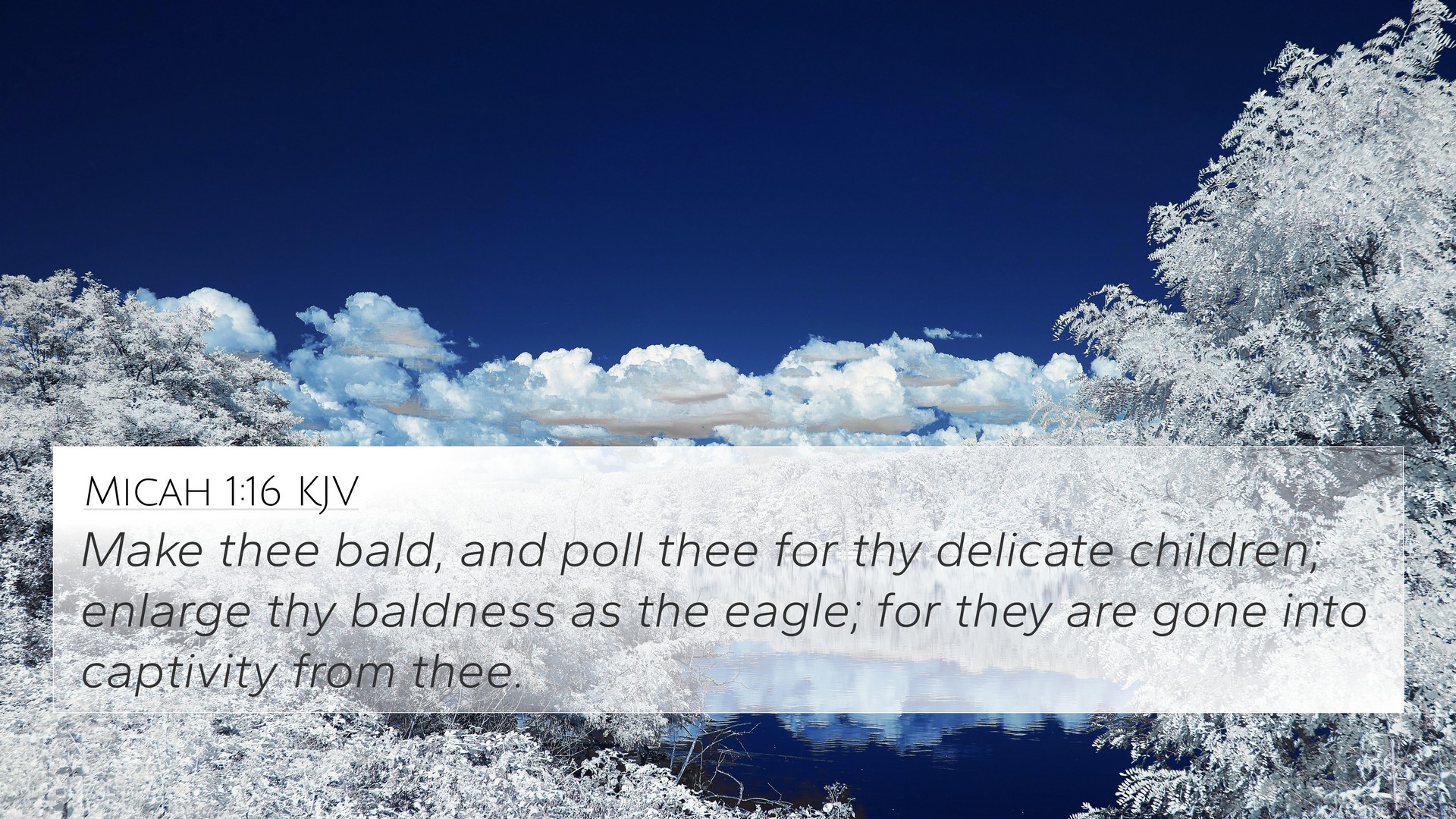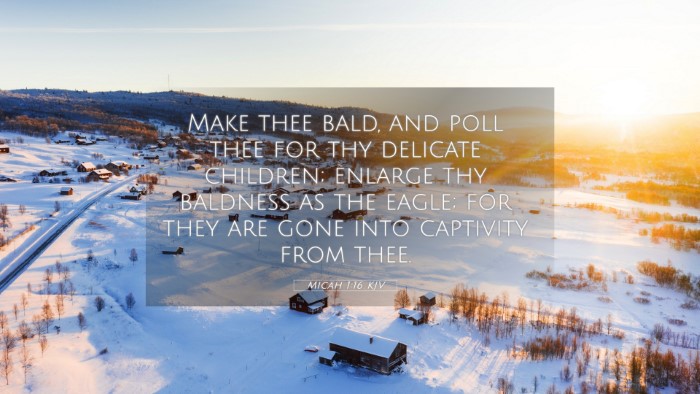Old Testament
Genesis Exodus Leviticus Numbers Deuteronomy Joshua Judges Ruth 1 Samuel 2 Samuel 1 Kings 2 Kings 1 Chronicles 2 Chronicles Ezra Nehemiah Esther Job Psalms Proverbs Ecclesiastes Song of Solomon Isaiah Jeremiah Lamentations Ezekiel Daniel Hosea Joel Amos Obadiah Jonah Micah Nahum Habakkuk Zephaniah Haggai Zechariah MalachiMicah 1:16 Similar Verses
Micah 1:16 Cross References
Make thee bald, and poll thee for thy delicate children; enlarge thy baldness as the eagle; for they are gone into captivity from thee.
Uncover the Rich Themes and Topics of This Bible Verse
Listed below are the Bible themes associated with Micah 1:16. We invite you to explore each theme to gain deeper insights into the Scriptures.
Micah 1:16 Cross Reference Verses
This section features a detailed cross-reference designed to enrich your understanding of the Scriptures. Below, you will find carefully selected verses that echo the themes and teachings related to Micah 1:16 KJV. Click on any image to explore detailed analyses of related Bible verses and uncover deeper theological insights.
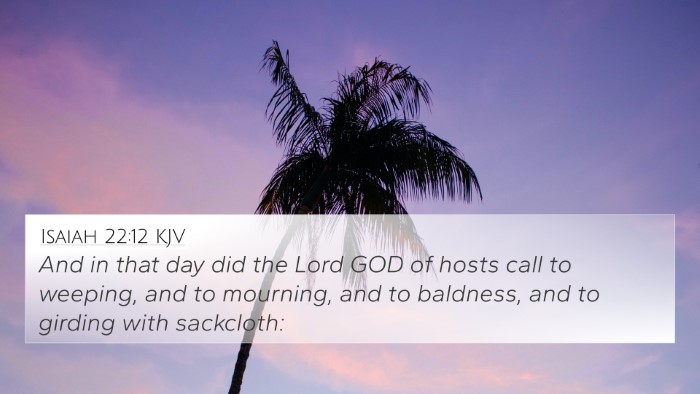
Isaiah 22:12 (KJV) »
And in that day did the Lord GOD of hosts call to weeping, and to mourning, and to baldness, and to girding with sackcloth:
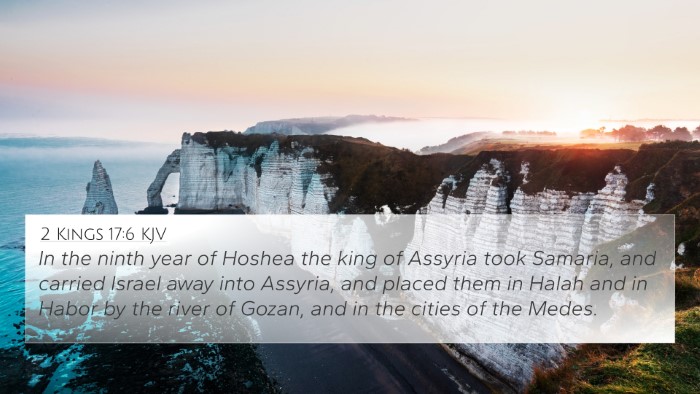
2 Kings 17:6 (KJV) »
In the ninth year of Hoshea the king of Assyria took Samaria, and carried Israel away into Assyria, and placed them in Halah and in Habor by the river of Gozan, and in the cities of the Medes.
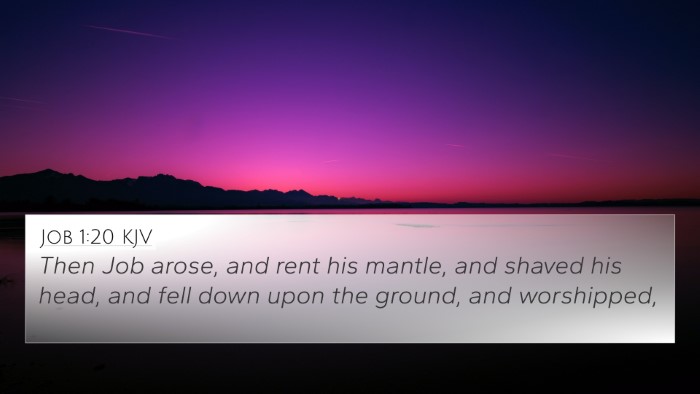
Job 1:20 (KJV) »
Then Job arose, and rent his mantle, and shaved his head, and fell down upon the ground, and worshipped,
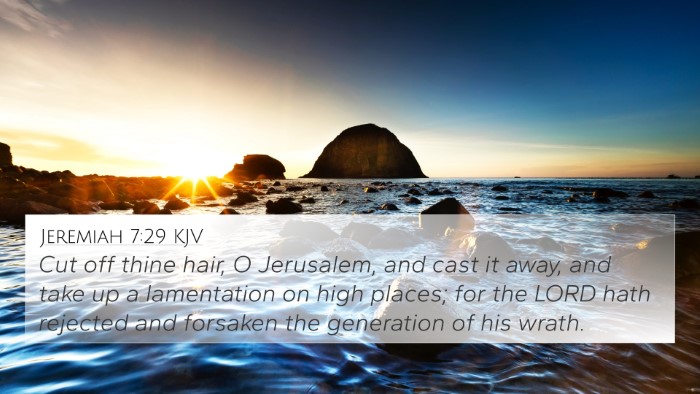
Jeremiah 7:29 (KJV) »
Cut off thine hair, O Jerusalem, and cast it away, and take up a lamentation on high places; for the LORD hath rejected and forsaken the generation of his wrath.
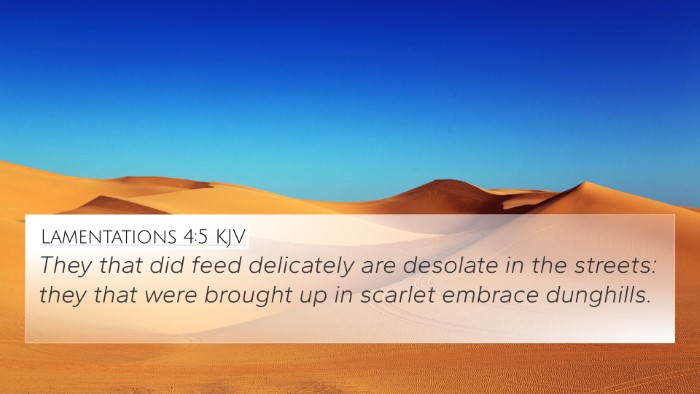
Lamentations 4:5 (KJV) »
They that did feed delicately are desolate in the streets: they that were brought up in scarlet embrace dunghills.
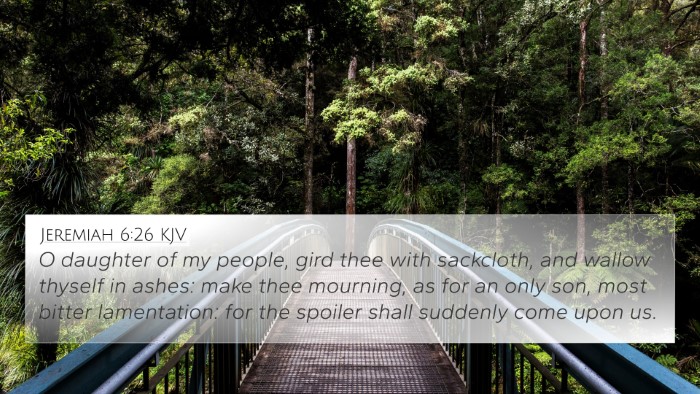
Jeremiah 6:26 (KJV) »
O daughter of my people, gird thee with sackcloth, and wallow thyself in ashes: make thee mourning, as for an only son, most bitter lamentation: for the spoiler shall suddenly come upon us.
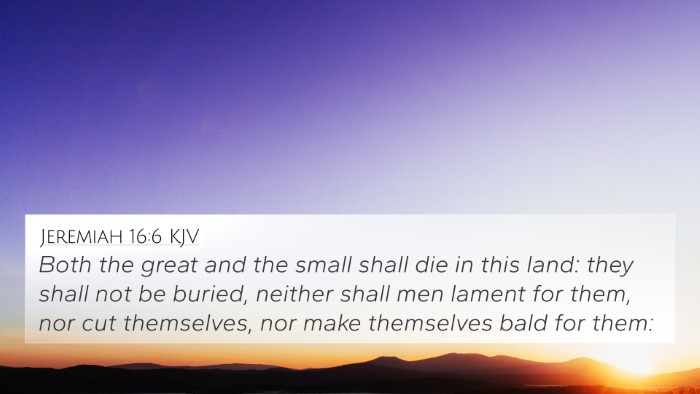
Jeremiah 16:6 (KJV) »
Both the great and the small shall die in this land: they shall not be buried, neither shall men lament for them, nor cut themselves, nor make themselves bald for them:
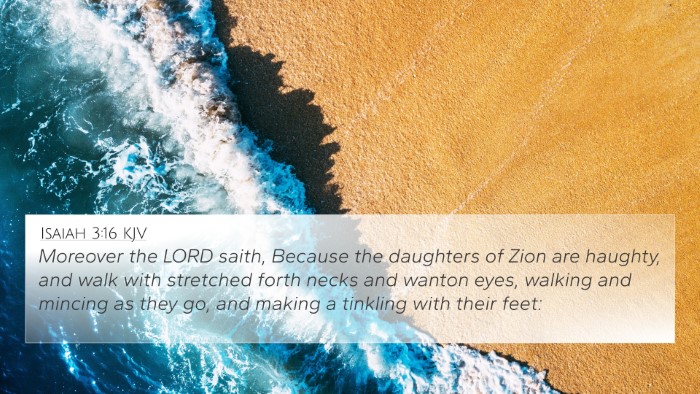
Isaiah 3:16 (KJV) »
Moreover the LORD saith, Because the daughters of Zion are haughty, and walk with stretched forth necks and wanton eyes, walking and mincing as they go, and making a tinkling with their feet:
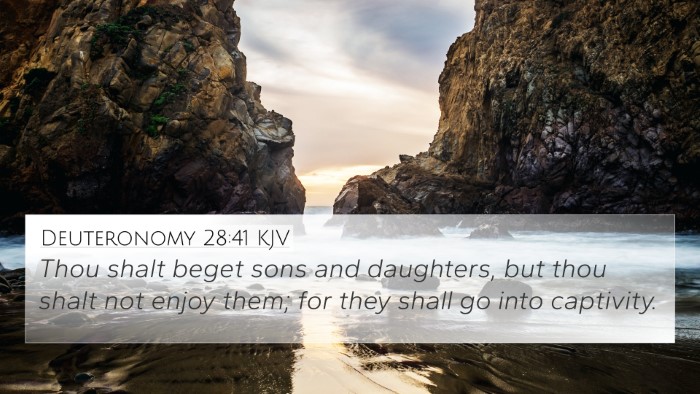
Deuteronomy 28:41 (KJV) »
Thou shalt beget sons and daughters, but thou shalt not enjoy them; for they shall go into captivity.
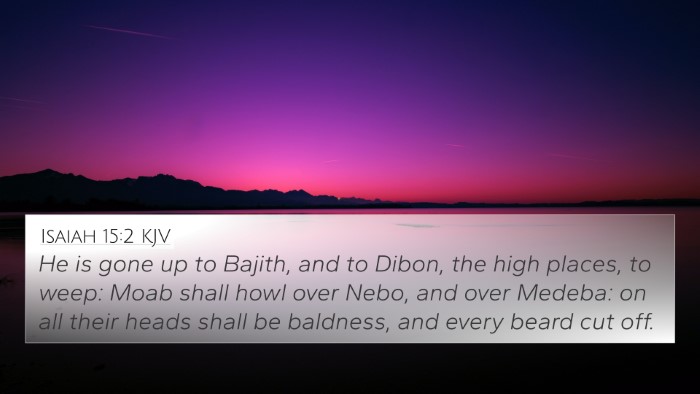
Isaiah 15:2 (KJV) »
He is gone up to Bajith, and to Dibon, the high places, to weep: Moab shall howl over Nebo, and over Medeba: on all their heads shall be baldness, and every beard cut off.
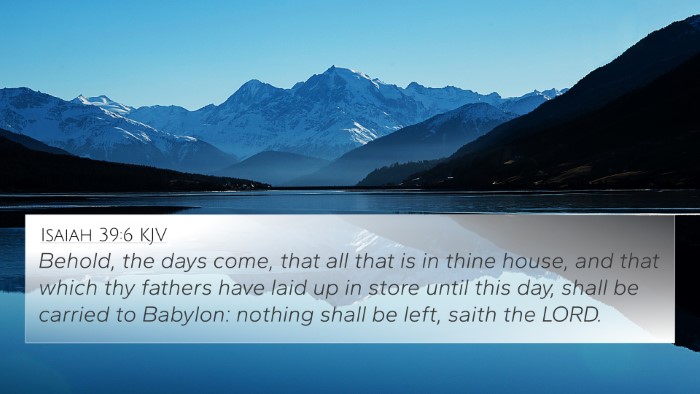
Isaiah 39:6 (KJV) »
Behold, the days come, that all that is in thine house, and that which thy fathers have laid up in store until this day, shall be carried to Babylon: nothing shall be left, saith the LORD.
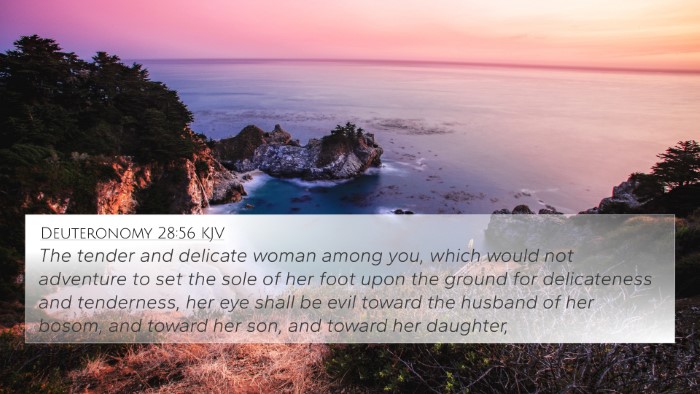
Deuteronomy 28:56 (KJV) »
The tender and delicate woman among you, which would not adventure to set the sole of her foot upon the ground for delicateness and tenderness, her eye shall be evil toward the husband of her bosom, and toward her son, and toward her daughter,
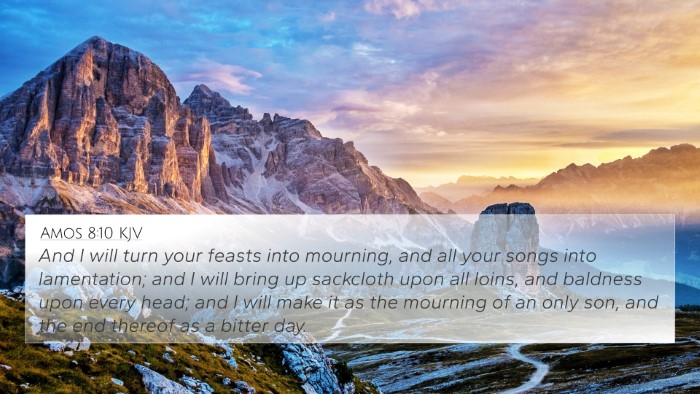
Amos 8:10 (KJV) »
And I will turn your feasts into mourning, and all your songs into lamentation; and I will bring up sackcloth upon all loins, and baldness upon every head; and I will make it as the mourning of an only son, and the end thereof as a bitter day.
Micah 1:16 Verse Analysis and Similar Verses
Bible Verse Meaning: Micah 1:16
Verse: "Make yourself bald and cut off your hair for the children of your delight; make yourself as bald as the eagle, for they shall go from you into exile." (Micah 1:16)
This verse from the book of Micah captures a deep emotional and prophetic significance regarding grief, mourning, and impending judgment on Israel due to its sins. To better understand this passage, we will explore insights drawn from public domain commentaries such as those by Matthew Henry, Albert Barnes, and Adam Clarke.
Understanding Micah 1:16
Context and Background
Micah, a prophet during a tumultuous time in Israel's history, addressed both the northern kingdom of Israel and the southern kingdom of Judah. His prophecy encompasses themes of judgment, repentance, and the hope of restoration after exile. In this chapter, Micah begins to lay the groundwork for the coming punishment due to the people's transgressions.
Verse Meaning: Grief and Mourning
According to Matthew Henry, the act of shaving one's head is a traditional sign of profound mourning. In ancient Israel, this demonstrated the seriousness of the situation. The ‘children of your delight’ likely refers to the people of Israel, whom God cherished. Their impending exile would cause a deep sense of loss not just for the parents but for the entire nation.
Albert Barnes further elaborates that this action symbolizes the complete desolation that Israel would face. The exiled children would represent the loss of heritage and the covenant blessings that came with being God's chosen people.
Symbolism of Baldness
Micah calls for baldness as a metaphorical expression of despair. Adam Clarke points out that the eagle’s baldness emphasizes the starkness of the loss. Baldness signifies a state of vulnerability and helplessness, illustrating that the people must mourn their state before God’s judgment is executed.
The Impending Judgment
This verse also defines the gravity of the judgment about to descend upon Israel. The actions portrayed in this verse foreshadow exile, which is a recurrent theme throughout prophetic literature. Scholars argue that Micah's calling for such outward signs of mourning underscores the need for genuine repentance among the people before the ultimate destruction takes place.
Cross-References and Thematic Connections
To gain a broader understanding of the themes presented in Micah 1:16, it is helpful to explore related Bible verses. Here are some key cross-references:
- Jeremiah 7:29: "Cut off your hair, and cast it away..." - Reflects similar themes of mourning and loss in the face of judgment.
- Ezekiel 24:15-17: God instructs Ezekiel about mourning for the impending fall of Jerusalem.
- Lamentations 3:48-49: "Mine eye runneth down with rivers of water for the destruction of the daughter of my people." - Expresses the sorrow felt during exile.
- Isaiah 15:2-3: "He is gone up to Bajith, and to Dibon, the high places to weep." - Discusses mourning over lost nationhood.
- Joel 1:8: “Lament like a virgin girded with sackcloth for the husband of her youth.” - Similar emotional response to impending loss.
- Zephaniah 2:15: "This is the rejoicing city that dwelt carelessly..." - Speaks to the pride and sudden downfall of cities.
- Luke 23:28: Jesus speaks to the daughters of Jerusalem about future calamities, paralleling themes of impending suffering.
- Revelation 18:7: Discusses the fall of Babylon and the depths of mourning that would follow.
- Matthew 5:4: “Blessed are they that mourn: for they shall be comforted.” - A contrast to the mourning described by Micah.
- Romans 8:22: “For we know that the whole creation groans and travails in pain.” - A broader context of suffering that God’s people experience throughout history.
Tools for Bible Cross-Referencing
Understanding and interpreting Micah 1:16 requires utilizing tools that aid in cross-referencing biblical texts. Here are some of the recommended tools:
- Bible Concordance: A comprehensive guide to find specific words or themes in the Bible and their corresponding verses.
- Bible Cross-Reference Guide: Helps navigate thematic connections across scripture.
- Bible Chain References: A method of linking verses on a topic for deeper understanding.
- Bible Cross-Reference System: Tools designed to identify interconnections between verses and themes.
- Comprehensive Bible Cross-Reference Materials: Includes study Bibles that have cross-references in margins for easy access.
Conclusion
Micah 1:16 serves as a poignant reminder of the consequences of sin and God's desire for His people to repent and return to Him. Through the symbolic actions of mourning and shame, Micah illustrates the gravity of the situation and the emotional responses that accompany a prophetic warning. By utilizing cross-referencing and exploring interconnected verses, one can derive greater insights into the themes of judgment, loss, and the hope of eventual restoration found in the Scriptures.
